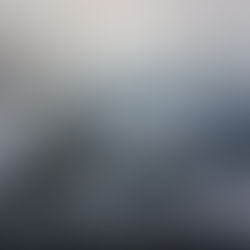Earthfulness

Many animals and plants live life on a knife edge. They are beautifully adapted to their ecological niche; the precise balance of energy, temperature, light and water that has shaped their being over time making them at once exquisitely in tune to their surroundings but at the same time precipitously sensitive to change. Emblems of international conservation remind us of this; the giant panda, in peril because of the slow contraction of their niche as bamboo fields make way for progress. Others we are likely blind to; the robin, visitor to our inner-city winter garden who we simply assume is complying with changes in the neighbourhood as and when they arise. They aren’t but did we notice? The niche functions like an invisible electrical fence, defining the precise conditions where animal or plant lives out its life. But it daren’t stray over the line. Change conditions within the niche and the organism, animal or plant, must fight for survival or die out. When change comes, natural selection will kill off the luddite favouring the innovator, the random mutant is permitted to live on because of its altered dependence on whatever shifted. The line moved and the balancing act continues.
Rarely, of course, organisms break out of the niche’s fence without changing. Most of the time, the specialisation of organisms is so great that, like water and oil, no matter how gregarious, the organism can’t by definition change its residence. But there are exceptions. If a new niche opens up, one never envisaged or experienced, the animal or plant finds itself by fortune to be pre-adapted to a new world; a place where it can rise rapidly to dominance. Superman on Krypton was normal but on Earth he is unstoppable. Think rabbits in Australia, brought by colonialists which ran rampant destroying vegetation. Grey squirrels, aliens from North America introduced to Europe where, without a natural predator they displaced their delicate and now much rarer red cousins. Or the seemingly innocuous ice plant, Carpobrotus edulis, a beach dweller originally from South Africa introduced into California in the early 1900s to help stabilize soil, now wreaking havoc on beach ecosystems muscling out native species. Barren dunes are all that is left behind. Pests. Weeds. Invaders. Pathogens. Organisms that have in our mind escaped from the natural order and now run riot, plaguing an ecological harmony just by their very presence. Ask the gardener who battles with the beautiful, purple, trumpet-flowered bind weed, a plant that strangulates trees, bushes or shoots in its path to slowly overtakes the humble back yard. Niche jumpers are generally unwelcome.
Safely within the normal order of things, organisms are expected to play by the rules. Don’t outgrow your potential. Don’t consume everything. Make children and look after yourself but not at the expense of the species. Indeed, from bacteria to large mammals there is good evidence that organisms really do sense when they have outgrown their surroundings or reached the boundary of their niche. Many microbes, for example, sense the depletion of nutrients in the environment due to overpopulation, modifying their growth towards an optimal density, slowing each other down in a process called quorum sensing. For larger mammals, like the arctic ground squirrel, when the population reaches the niche’s maximum capacity, females will respond by dramatically reducing their reproduction or even die during hibernation. An awesome commitment to control growth and the continuation of the niche for the good of the species or genes.
As such, working with these checks and balances Earth, our unique blue planet, allows myriad organisms to flourish on its surface. Niches have expanded and contracted over eons of time. Organisms in each have diversified. Some broke the rules and new orders have come into existence as environments and habitats have changed. There always seems to be more diversification. Fracture and change. Fracture and change. And like Darwin, we can marvel at the sheer joy of the complexity and diversity that is so apparent in nature. That which came eons before us and that which will come in the future. Whether our eyes are cast over Caribbean coral reefs or looking under the stone in a patch of green in the middle of a highway. Diverse life, beautiful and ugly, surprising niches abound everywhere. Rogues come and go but the balance, whilst always moving, remarkably seems to stay in place.
So, what happens when an organism doesn’t just break the rules but tears them up. No longer self-regulating but escapes the trip-switch of population self-sensing. Growing, consuming, destroying each new habitat it encounters and unencumbered by the barriers that normally keep the palette of Earth’s colours from blending. What do we make of such a gargantuan niche-breaker that reproduces, consumes and spreads without containment? A super weed? A rogue? We would rightly be afraid for Earth. Well, there is now just such an organism slowly emerging on our planet. Earth has seen many villains over 3-4 billion years. Cyanobacteria gave us 20% oxygen, those that this killed don’t live on to complain about the changes. But the organism I refer to is unlike anything that has come before it. Unbounded by hemisphere. Unfettered by land, sea or air. It is spreading and it is multiplying. An organism that appears not to regulate itself but to charge forth. 1% growth a year. Slowly but surely taking over wherever it sets foot. Consuming, destroying. Life on Earth itself may very well be under threat. Indeed, since its possible to seed outside the confines of Earth, there is a chance it may already have polluted beyond of its planetary origins. Has any organism ever broken free of Earth?
Most frightening of all, many remain entirely oblivious to the existence of this plague. Ironically for them, it has a name – it is human. It is us. We are out of control. We the supreme conscious being. And we are doing it knowingly.
What is the solution? One of profound self-hatred. Shame. May be our self-declared divinity is so great that we break the bonds of our nature and rule the planet by right? A Machiavellian ruler, standing ruthlessly over a subdued planet and beyond. Can we even stop? What about segregation – keep humanity and nature separate. Let the natural world continue in refuges within our pre-defined boundaries. Wild-life parks. Reserves. Maybe we really do deserve the sentence our own expansion costs? May be the experiment on Earth has come to an end?
I believe there is a solution.
It will take time, lifetimes, generations, but we can change the balance. We are conscious beings. We can stare into the mirror of nature and realise we don’t need to think of how to fix it but how to feel a part of it. We are as much a piece of the Earth as the panda, the squirrel, the cactus or the microbe. Our cities, factories, vehicles and technical innovations are no less a part of nature than beaver dams or bee-hives. Our energy, like all life, comes from the very fabric of the planet – oil from the ground, wind from the air. Even if we make it in the lab, philosophically, there is nothing synthetic. If we take off our shoes and let our feet feel the earth, real earth even more so than concrete, our Earth, then maybe we can reconnect with what we’re standing on. Perhaps our consciousness could allow us to imbue every decision with a sense of being at one with Earth. Earthfulness.
If we can train our minds to make every miniscule decision from a place of connectedness to the whole, then we become at one with Earth. I’ll buy low energy lightbulbs today, not to save me money but because they use less of the Earths fuel, they keep the balance going. I’ll choose a locally sourced vegetable. Not because its organic but because it used less fuel to bring it to me, lowering the impact on the global niche. I’ll walk. It’ll keep me alive longer, it’ll reconnect me with terra firma and it’ll be one less unnecessary part per million for the atmosphere. In the 1960s a similar philosophy emerged called Gaia – the idea that Earth has an almost spiritual wholeness, a balanced whole of which we are part. But it doesn’t need a name or a social movement to drive it. At the end of the day, it should be something as selfish as the decision by an elephant to change its feeding place or a sapling to grow away from the parent. Personal survival driven by a deep connectedness to the finite nature and resources of Earth. Our home. We are a part of it, it’s time we reminded ourselves that. Virtual reality, smart phones, our technical arrogance – it’s all cool, but it is just another metamorphosis of the same energy that gave rise to redwoods and the great barrier reef. We need to fix the whole in our mind, recognise that whilst our niche might uniquely be the entire planet, it still has a fence, still needs a boundary to protect it. Earthfulness needs to come from within, whilst we still have the time.
© Jake Baum, 2017. www.baumlab.com
First published on LinkedIn - https://www.linkedin.com/pulse/earthfulness-jake-baum



















